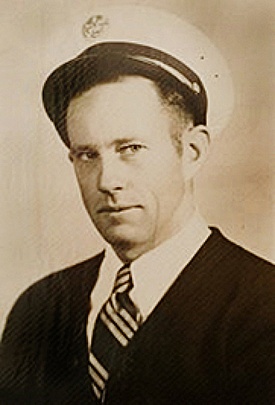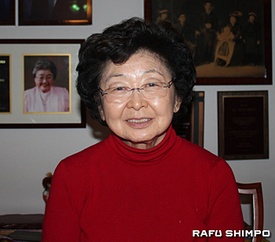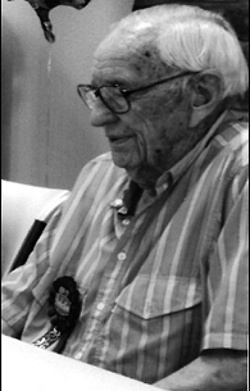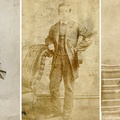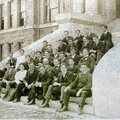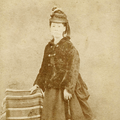Japanese residents who were helped and heartfelt exchanges
Due to the wartime eviction orders, many Japanese residents lost everything they had worked so hard to build, including their homes, land, and jobs.
Some non-Japanese Americans volunteered to manage their homes and land while incarcerated in the camps, but many of them sold their land without permission, and when they returned from the camps, their homes and land often belonged to others.
One of them was the late Keizaburo Koda, known as the Rice King of California. While he was interned in a concentration camp, Koda was betrayed by a non-Japanese American who had entrusted him with managing his farm, and two-thirds of his land and his rice mill were sold off without permission, resulting in the loss of the vast land he owned before the war.
However, there were non-Japanese Americans who continued to protect their homes and land while the Japanese were incarcerated in internment camps.
Here we would like to introduce some of the people who continued to protect the land until the Japanese residents returned from the internment camps. These are people who kept their promises to the Japanese residents, even as anti-Japanese sentiment grew and they were sometimes subjected to slander and criticism from other non-Japanese Americans. A Japanese resident who was a child at the time spoke to the Rafu Shimpo about his heartfelt exchanges with these people and his memories of them.
* * * * *
Bob Fletcher : The man who continued to protect the Japanese family farm
Marielle Tsukamoto, a third-generation Japanese American living in Elk Grove, Sacramento County, was one of the Japanese Americans who was interned at the Jerome Internment Camp in Arkansas with her family when she was five years old.
Before the war, the Tsukamoto family farmed in Florin, growing strawberries, grapes, and other crops. However, with the outbreak of war between Japan and the United States, the family's circumstances changed dramatically. They were forced to leave, and dark clouds hung over the future of the farmland they had cultivated and the house they had lived in.
At that time, a ray of hope appeared in front of the family when a non-Japanese American man appeared before them.
The man's name was Bob Fletcher, who was then an agricultural inspector for the state of California, but he quit his job and promised to manage the 90 acres of land owned by the Tsukamoto family, as well as the neighboring Nitto and Okamoto families.
"Not only did Bob farm our fields while we were in the camp, he paid our taxes and even saved most of the profits from our crops for us so that we would be able to live as soon as we returned from the camp."
At the time, there were many non-Japanese Americans who took over Japanese farms around Florin, but many of them ended up making the farms their own. Many of them didn't even cultivate the land and let the crops wither.
This is how Japanese residents who returned from the internment camps found their farms changed so dramatically.
Meanwhile, Fletcher and his wife, Teresa, were concerned about the Tsukamoto family, and when they found out that the family would be returning from the internment camp, they cleaned the house the family had been living in and even had food ready in the refrigerator for them.
Some Japanese residents were lucky enough to have their homes and farms preserved, but many had no electricity and most had no food.
"I was sent to the camp with just the clothes on my back. I wasn't allowed to take any animals with me, so I was separated from my beloved dog Api. Api was a member of my family, but I had no choice but to leave him behind, crying."
Fletcher later told Tsukamoto that Api had suddenly vanished. "I think he went looking for us and never came back." It was a heartbreaking farewell for the five-year-old girl.
"The same mistakes are being repeated"
Even after they returned from the internment camps, prejudice against Japanese residents continued. "My father was so afraid of discrimination that when he returned home from the internment camps, he turned off the lights in his car so that no one would notice that we had returned."
"Even when she went shopping at stores, they wouldn't sell her things, and she was sometimes not even allowed into restaurants. I was afraid of being discriminated against from an early age. 'I have to be careful because I'm Japanese.' I wanted to be 'American.' That's why I didn't go to Japanese language school."
However, as the years passed, five to ten years after the war, the number of Japanese stores gradually increased and the situation gradually improved.
Tsukamoto is the former president of the Florence-Sacramento chapter of the JACL. Last year, he folded many cranes to show his solidarity with the Japanese-American civic group "Tsuru for Solidarity," which opposes the Trump administration's immigration policy of using the Fort Sill military base in Oklahoma to detain migrant children. As someone who was sent to an internment camp during the war, he expressed his solidarity by folding many cranes.
"The current administration's immigration policy is dangerous. They are trying to repeat the mistakes they made against Japanese Americans. I have had the same experiences as them (children of immigrants). That's why I will stand up for them," she said emphatically.
Even if I get shot at sometimes
One day, Tsukamoto's father discovered a bullet hole in the window of the warehouse. "There were no bullet holes like that before we went to the internment camp. Even if there were a hunter, who would shoot at the warehouse?" It was clear that someone had shot at Fletcher, who was helping the Japanese residents.
"Bob was a very humble and modest man. The bullet just happened to miss him, but it was clear that someone was trying to shoot him. He was a man who never spoke ill of others. When my father asked Bob if he had been discriminated against while looking after the Japanese land, he would always just say, 'I was busy, so I didn't care.'"
Fletcher later became a volunteer firefighter in Florin, which did not have a fire station at the time, and when the city's fire station was established he became the chief. He also actively participated in local community activities and became known as a community leader.
He passed away in Sacramento on May 23, 2013. He was 101 years old. There is now a community center and a road named after him in the town of Florin.
According to Tsukamoto, Fletcher never wanted people to know about what he had done, but on one occasion he said:
"What I did was nothing special. I just did what I thought was right."
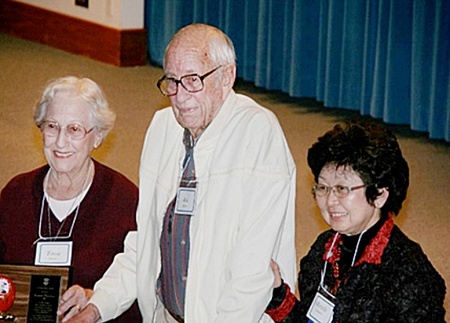
*This article is reprinted from the Rafu Shimpo (January 3, 2020).
© 2020 Junko Yoshida / Rafu Shimpo


